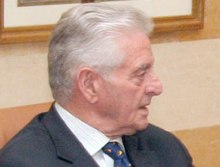 National Liberal Party ( NLP) leader MP Dori Chamoun called on Wednesday for reducing the size of Lebanon parliament from 128 to 88 members to save the Lebanese taxpayers money, adding that Lebanon should have as many MPs as electoral districts .
National Liberal Party ( NLP) leader MP Dori Chamoun called on Wednesday for reducing the size of Lebanon parliament from 128 to 88 members to save the Lebanese taxpayers money, adding that Lebanon should have as many MPs as electoral districts .
“I support the individual-districts electoral law proposal and for this reason there should be 88 MPs instead of 128 so that we save the Lebanese taxpayers [money] since each MP’s salary is paid for by the people,” Chamoun said in a statement on Wednesday.
Members of a parliamentary sub-committee began earlier in the month their discussion of different draft laws in order to choose a proposal to replace the 1960 electoral law. Lebanon’s different political contingents remain divided over which law to adopt .
The electoral subcommittee on Wednesday ended its meeting without reaching any agreement over a new parliamentary electoral law for the 2013 parliamentary elections.
According to MP Robert Ghanem who chairs the committee “the joint parliamentary committees will convene next Tuesday to tackle the subcommittee report and refer it to Speaker Nabih Berri.”
He revealed after Tuesday’s discussions that the meeting focused on the so called Boutros commission electoral draft-law
In 2006, the government-appointed National Commission for a New Electoral Law, known as the Boutros Commission, authored a draft law that proposed major changes to the 1960 electoral system, but the recommendations have since been shelved.
The Boutros Commission called for a hybrid electoral law, under which 77 of Parliament’s 128 members would be elected by winner-take-all, and the remaining 51 members would be elected by proportional representation.
March 14 MP Michel Pharaon submitted another proposal yesterday which called for holding the elections in two stages.
The first will be based on an amended version of the Orthodox Gathering law, while the second stage will be held based on an amended version of the 1960 law that was approved during the 2008 Doha conference and adopted during the 2009 elections.
The MP is proposing that the candidates who win 20 percent of the vote will advance to the second phase of the elections.
The first phase of the elections would appease Christian concerns through the adoption of the Orthodox Gathering proposal, he said.
“These concerns are national ones, not just Christian. Had we implemented the agreements of the national dialogue, we would not have reached this current situation in Lebanon,” Pharaon noted in reference to all the agreements reached during the National Dialogue talks that started in 2006.
The subcommittee had initially met to discuss the following draft-laws:
Proportional Representation ( PR)
Lebanon’s Cabinet approved last August an electoral draft law which is referred to as the Charbel law ( in reference to Interior minister Marwan Charbel ) that called for proportional representation and divided the country into 13 districts as follows: Beirut 2, south Lebanon 2, Bekaa 3, north Lebanon 3 , Mount Lebanon 3.
The new electoral law was approved by the majority of ministers, including the Free Patriotic Movement Ministers (FPM) . However the 3 ministers that represent Progressive Socialist Party leader MP Walid Jumblatt’s bloc voted against it.
According to analysts Proportional representation has long been an objective of Shiite representatives, long before the formation of Hezbollah in the 1980s—and even before Amal’s in the 1970’s. Yet, support for PR has put the Shiite political parties at odds with others and specially the Christians and the Sunnis.
Orthodox Gathering
FPM MPs Alain Aoun and Neemtallah Abi Nasr submitted another draft electoral law to the parliament even though the FPM ministers voted for the PR system . This is the so called “Greek Orthodox gathering proposal” which calls on each sect in Lebanon to vote only for its candidate in the elections based on one electoral district for the whole country .
A Christian four-party panel on the electoral law agreed last Sunday to endorse the so-called Orthodox Gathering proposal
The panel took its decision during a meeting held in Bkirki. The four-party panel comprises representatives from the Free Patriotic Movement, the Lebanese Forces, the Phalange Party and the Marada Movement.
The Orthodox law was also criticized by President Michel Suleiman, Premier Najib Mikati, National Struggle Front leader Walid Jumblat and several other Christian MPs specially those belonging to the Greek Orthodox sect
Small districts
March 14 Christian MPs Georges Adwan, Boutros Harb and Sami Gemayel submitted a draft electoral law based on 50 districts and winner take all majority to the Parliament’s General Secretariat last October.
Most March 14 politicians prefer this law but it is opposed by all the Hezbollah led March 8 alliance
1960 electoral law
This is the current law which is based on the Qada( county) as the electoral district.
Jumblatt and his PSP MPs still favor this 1960 majoritarian (or “winner take all”) system, but almost all the other lebanese politicians in March 14 and March 8 reject this law and call it unfair
Lebanon’s four major Christian parties, including the opposition Lebanese Forces and Phalange parties, endorsed the Orthodox Gathering’s draft law , however, the NLP, Future Movement, Progressive Socialist Party and independent March 14 Christians oppose the draft.

Leave a Reply
You must be logged in to post a comment.